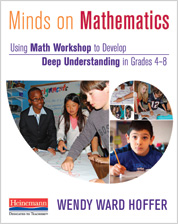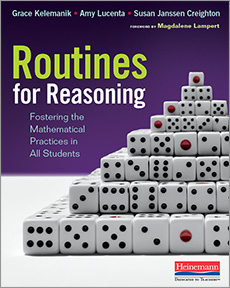Online Learning

Any of our online courses can be taken for FREE or for credit ($55/credit). For each course, you have 1 calendar year to complete the coursework. You can enroll in any of the following courses for free by following this PDF, Online Learning Enrollment Instructions.
Available Courses
- Developing Number Sense with Number Talks
- Mastering Basic Math Facts
- Book Study: Becoming the Math Teacher You Wish You'd Had
- Book Study: Minds on Mathematics
- Book Study: Routines for Reasoning
Mastering Basic Math Facts
A solid understanding of math facts is important because students form the building blocks for higher-level math concepts. This course will help you understand why children struggle learning and remembering their math facts and what to do about it.
- There are five modules with a quiz at the end of each.
- Module 1: Understanding the Developmental Nature of Basic Math Facts
- Module 2: Mastering Basic Math Facts
- Module 3: Reasoning Facts for Addition/Subtraction Facts
- Module 4: Reasoning Strategies for Multiplication/Division Facts
- Module 5: Remediation and Assessment
- Materials: All materials provided
- Cost (For Credit Only): $195
Book Study: Becoming the Math Teacher You Wish You'd Had
About the Book: While mathematicians describe mathematics as playful, beautiful, creative, and captivating, many students describe math class as boring, stressful, useless, and humiliating. In Becoming the Math Teacher You Wish You’d Had, Tracy Zager helps teachers close this gap by making math class more like mathematics.
Tracy spent years with highly skilled math teachers in a diverse range of settings and grades. You’ll find this book jam-packed with new thinking from these vibrant classrooms. You’ll grapple with big ideas: How is taking risks inherent to mathematics? How do mathematicians balance intuition and proof? How can teachers value both productive mistakes and precision? You’ll also find dozens of practical teaching techniques you can try in your classroom right away—strategies to stimulate students to connect ideas; rich tasks that encourage students to wonder, generalize, conjecture, and persevere; routines to teach students how to collaborate.
All teachers can move toward increasingly authentic, delightful, robust mathematics teaching and learning for themselves and their students. This important book helps us develop instructional techniques that will make the math classes we teach so much better than the math classes we took.
** You will need to purchase the book. Instructions are posted once you enroll.
About the Course: This important book helps us develop instructional techniques that will make the math classes we teach so much better than the math classes we took. There are five (5) quizzes. To pass the course, each quiz must be passed with an 80% score. This is not an overall average of all test scores, but rather on each chapter quiz. Be sure to thoroughly study the chapters in order to be prepared for taking the quizzes. Upon completion of the fifth quiz, you have finished the course. There are no assignments or papers. Included in each module are discussion questions and activities to try. These are intended to support you as you read the book and implement its precepts. They are not required to pass this course.
Book Study: Minds on Mathematics
About the Book: “Here, at last, is a book for teachers who have understood and implemented readers’ and writers’ workshops, but have struggled to create a manageable math workshop.” —Ellin Oliver Keene
Why is it that so many of our students don’t get math?
Wendy Ward Hoffer argues that all learners are capable of deep understanding—but first we must create classrooms where teachers serve as coaches, students engage as a community of learners, and everybody works toward “getting it” together. Minds on Mathematics shows you how. Wendy explains the core elements of math workshop and then provides detailed strategies for implementing the workshop model. Effective routines and abundant examples are provided for each component of the workshop, including planning openers that “hook” learners with engaging tasks using mini-lessons to model thinking and problem solving managing work time for both group and independent learning creating classroom routines that support conferring ensuring deep understanding with sharing and reflecting opportunities. Minds on Mathematics shows how to make the workshop model come to life in your math classroom! It proves that when we provide math learning experiences that support students to become critical thinkers and problem solvers, to stretch and think in new ways, and then invite them to communicate their ideas to others, we inspire them to “get” math like never before.

** You will need to purchase the book. Instructions are posted once you enroll.
About the Course:This course will cover using math workshop to develop deep understanding in grades 4-8. For every two chapters, there is a quiz. To pass the course, each quiz must be passed with an 80% score. This is not an overall average of all test scores, but rather on each chapter quiz. Be sure to thoroughly study the chapters in order to be prepared for taking the quizzes. Upon completion of the Chapter 10 quiz, you have finished the course. There are no assignments or papers. Included in each module are discussion questions and activities to try. These are intended to support you as you read the book and implement its precepts. They are not required to pass this course.
REGISTERBook Study: Routines for Reasoning
About the Book: "Routines for Reasoning will help teachers think a lot harder about what the mathematical practices mean…This book should be on every mathematics teacher’s bookshelf." — Elham Kazemi, Geda and Phil Condit Professor in Mathematics Education, University of Washington; coauthor of Intentional Talk
Routines can keep your classroom running smoothly. Now imagine having a set of routines focused not on classroom management, but on helping students develop their mathematical thinking skills. Routines for Reasoning provides expert guidance for weaving the Standards for Mathematical Practice into your teaching by harnessing the power of classroom-tested instructional routines.
Grace Kelemanik, Amy Lucenta, and Susan Janssen Creighton have applied their extensive experience teaching mathematics and supporting teachers to crafting routines that are practical teaching and learning tools, including:
- Capturing Quantities: encouraging abstract and quantitative reasoning
- Connecting Representations: noticing and using mathematical structure
- Recognizing Repetition: developing repeated reasoning skills
- Three Reads: starting and sustaining thinking in problem solving situations
Each routine provides a familiar, accessible structure that supports repeated use until the steps to follow, thinking skills to employ, and questions to ask become automatic—enabling all students to engage more fully in learning opportunities while building crucial mathematical thinking habits. “Teaching students to think and reason is perhaps the greatest challenge we face as math educators,” the authors remind us, “and these routines provide clear pathways to do so.” Far beyond simply a collection of strategies, Routines for Reasoning provides significant support for getting started with these routines, incorporating them into the rhythm of your classroom, and ultimately building toward student independence.

** You will need to purchase the book. Instructions are posted once you enroll.
About the Course: This course will cover instructional routines to help students develop their mathematical thinking. For each of the seven chapters, there is a quiz. To pass the course, each quiz must be passed with an 80% score. This is not an overall average of all test scores, but rather on each chapter quiz. Be sure to thoroughly study the chapters in order to be prepared for taking the quizzes. Upon completion of the Chapter 7 quiz, you have finished the course. There are no assignments or papers.
Developing Number Sense with Number Talks
What are Number Talks?
-
A 5-15 minute classroom conversation around purposefully crafted computation problems that are solved mentally.
-
The best part of a teacher's day!
Episode Descriptions
-
Episode 1: Using Number Talks to Build Number Sense
Presenters: Veronica Blackham
Time: 01:08:05This block is for those who are not familiar with Number Talks or would like a general refresher. Number Talks are a 5-15 minute daily routine designed to develop number sense (not to be confused with math talk or classroom discussion). This brief routine promotes flexibility, efficiency, and numerical accuracy-- the very definition of mathematical fluency.
-
Episode 2: Number Talks in a Virtual Setting
Presenter: Angie Godfrey
Time: 1:53:51Number talks can be facilitated via live streaming, such as Zoom or Google Meets. Angie will share her experience, tools, and insights on how to effectively do this.
-
Episode 3: Number Talks in the Secondary Classroom
Presenter: Veronica Blackham
Time: 00:49:23This block will be used to help secondary math teachers understand how number talks can support students’ in improving their numeracy skills. We will first spend some time learning how students form the concept of number and their operations. Then we will relate these ideas to Number Talks and discuss the benefits and practicality of using Number Talks in the secondary classroom.
How to Access the Workshop
The Idaho Regional Math Center is providing this online workshop for free to teachers. In order to access the content you will need to register for the course. Once registered, the course URL and information will be emailed to you. Optional PD (1) credit available.
REGISTER
